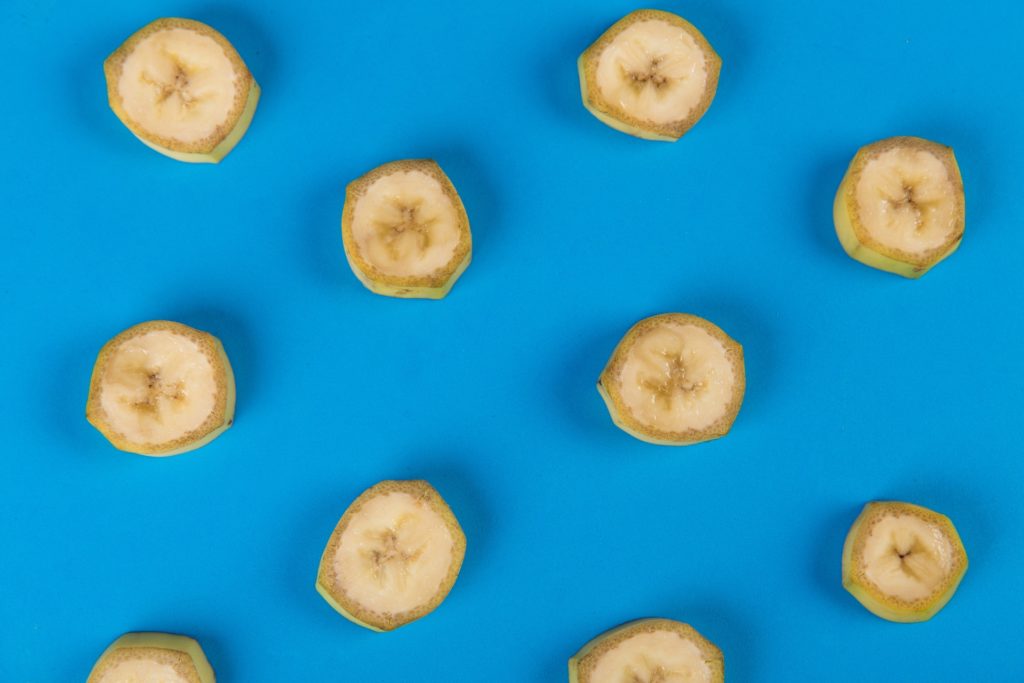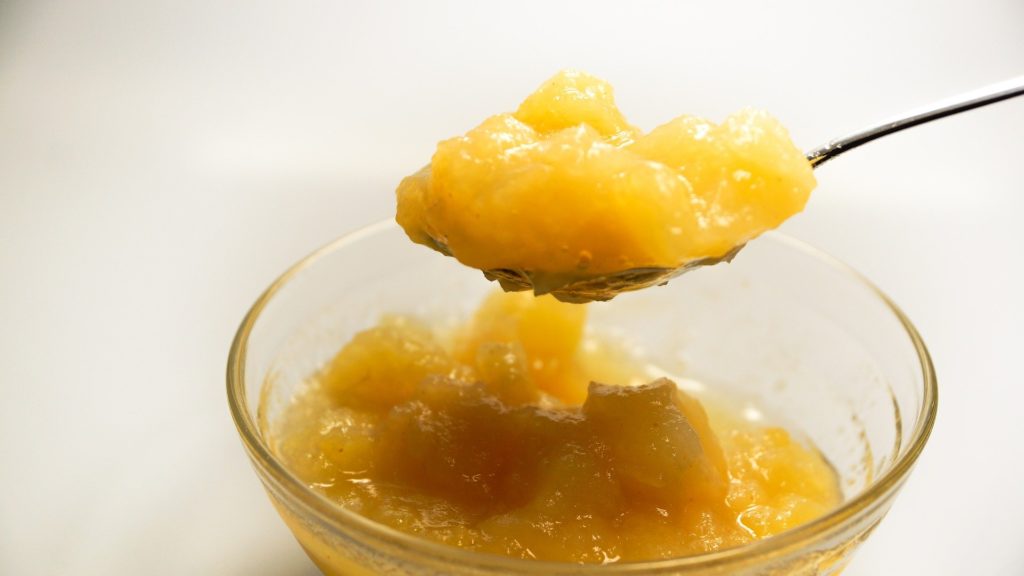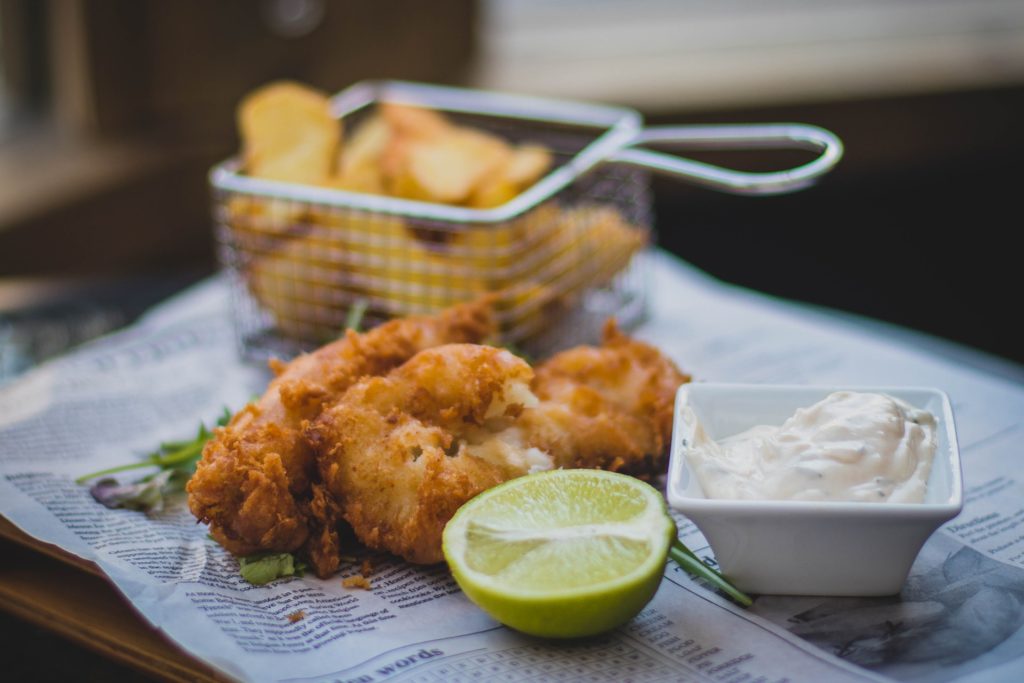This post was originally published in April 2020. Updated in November 2022.
It’s challenging to determine what to eat when you have an upset stomach as some foods can worsen the condition and cause even more stomach pain.
Tummy troubles symptoms include diarrhea, constipation, nausea, bloating, vomiting, abdominal pain, and cramps.
Many factors could lead to digestive problems including stress, irritable bowel syndrome, foodborne illness, and food poisoning.
Luckily, certain foods help relieve stomach pain, calm your stomach, and reduce other digestive problems including:
Table of Contents
What To Eat When You Have An Upset Stomach?
1- Bananas

If you are experiencing diarrhea, eating bananas can help you recover. Bananas are rich in pectin which is known as the thickening fiber. It helps absorb water from the intestine and firm up stools.
Banana contains also vitamin B6 which reduces fluid retention and relieves bloating. Magnesium in Banana can relax muscles which reduces cramps and spasms. Plus, they can replenish the potassium that your body loses if you’re vomiting or have diarrhea.
2- Papaya
Papaya contains a natural digestive enzyme called papain which breaks down proteins in food. This helps your body digest and absorb food better. So, eating papaya when you have an upset stomach can reduce digestive problems.
A study showed that taking Caricol (papaya concentrate) can reduce constipation. It can also relieve bloating and heartburn.
Another study showed that papaya seeds can decrease intestinal parasites due to their antiparasitic properties. Those parasites can cause abdominal pain and discomfort.
3-Ginger Tea

Ginger tea can relieve nausea and vomiting which are common symptoms of an upset stomach. It also treats dyspepsia, speeds up gastric emptying, and relieves period pain.
Plus, ginger helps your body to recover from food poisoning due to its medicinal properties.
6 studies showed that ginger tea can help pregnant women get rid of morning sickness. Furthermore, ginger is effective in reducing chemotherapy-induced nausea.
So, ginger tea can settle your upset stomach. But it can cause heartburn, diarrhea, and stomach pain when you consume more than 4 grams of ginger per day.
4- Probiotic-Rich Food
Probiotics are good bacteria that help improve gut health. Foods that are rich in probiotics like yogurt can ease stomach pain and relieve diarrhea. Studies showed eating yogurt can reduce bloating and other IBS symptoms. Also, it can relieve constipation.
Consume plain yogurt that contains active bacterial cultures to improve digestion. Yogurt can also boost your immune system to fight infections.
Also, a study showed that buttermilk can relieve constipation. Other studies showed that buttermilk may prevent antibiotic-associated diarrhea.
5- Chamomile Tea

People have used chamomile as a natural remedy for centuries to ease stomach pain. Chamomile tea can reduce IBS symptoms like nausea, gas, and bloating.
It has antioxidant and antimicrobial properties that can relieve bloating and indigestion. Plus, it can treat ulcers and inflammation and reduce spasms.
Chamomile tea helps you relax and reduce stress levels that could cause stomach pain. When you’re stressed, your stomach doesn’t digest food as it should. And this results in causing stomach pain, bloating, and cramps.
Chamomile extracts may also shorten the course of diarrhea in children. Animal studies showed that chamomile tea has medicinal properties that can relieve stomach pain. But we still need more human studies to confirm its benefits.
Related: Top 13 Benefits Of Drinking Chamomile Tea For Skin & Health
6- White Rice
When you have an upset stomach, you should eat food that is easy to digest like white rice. Eating rice helps absorb fluids and firm up stools which will relieve diarrhea. Also, rice contains potassium and magnesium, and they can reduce stomach pain and cramps.
You can eat whole-grain foods like brown rice again when you feel better. Whole-grain foods are full of fiber, antioxidants, and vitamins that your body needs to stay healthy, but they take longer time to digest which might worsen stomach pain.
7- Peppermint Tea

Drinking peppermint tea can reduce bloating, stomach pain, and other IBS symptoms. Peppermint is used also as a natural remedy to treat dyspepsia.
Studies showed that peppermint oil capsules help ease stomach pain and relieve diarrhea in people with IBS. Peppermint oil can relax muscles and reduce intestinal spasms. We need more human studies to confirm its benefits.
Keep in mind that people with GI reflux, Kidney stone, and Hiatal hernias should avoid peppermint as it’s not safe for them.
8- Flaxseed
A study showed that bowel movements increased by 30% in adults who consumed flaxseed daily. Flaxseed or flaxseed oil helps relieve constipation and ease stomach pain.
Another study showed that taking 4 ml of flaxseed oil daily can improve the consistency of stools. Plus, animal studies showed that flaxseed can prevent stomach ulcers and relieve diarrhea. But we still need more human studies to confirm these results.
9- BRAT Diet

If you have diarrhea, the BRAT diet can help speed up recovery. The BRAT diet includes bananas, applesauce, rice, and toast. These foods don’t put stress on the digestive system as they’re easy to digest. They also absorb excess fluids and firm up stools.
Those bland carbohydrates can settle an upset stomach, reduce irritation, and soothe stomach pain.
When your stomach feels better, you can add whole-grain foods again to your diet, as they are full of nutrients your body needs.
10- Low-FODMAP Diet
Doctors may recommend a low-FODMAP diet to patients with IBS. Several studies showed that the low-FODMAP diet helps to improve IBS symptoms in at least 74% of patients.
High-FODMAP foods can cause gas, bloating, and diarrhea. High-FODMAP diet includes:
- Watermelons.
- Onions.
- Garlic.
- Pears.
- Apples.
- Broccoli.
- Cauliflower.
- Wheat.
- Artichokes.
- Cabbage.
Studies showed that a low-FODMAP diet is an effective method that helps to reduce IBS symptoms. Another study showed that this diet can improve the quality of life in patients with IBS. And it can reduce pain and other digestive problems.
11- Water
Drinking enough water throughout the day can help relieve constipation. Also, diarrhea and vomiting cause dehydration. So you should keep your body hydrated if you’re experiencing diarrhea or vomiting.
Water helps your body also digest food and absorb nutrients well. It’s best to drink at least 2 liters of water per day.
Related: How To Tell If You Are Dehydrated: 11 Early & Warning Signs
What To Not Eat When You Have An Upset Stomach?

After including above what you should eat when you have an upset stomach, you should also know which foods to avoid:
- Fried food.
- Fatty food.
- Salty food.
- Processed food.
- Smoking.
- Alcohol.
These foods are difficult to digest as they can put stress on the digestive system. They can cause stomach pain, cramps, gas, and bloating.
Alcohol causes also damage to the stomach lining and liver. Plus, studies showed that smoking can cause throat irritation and stomach ulcers which could increase the risk of an upset stomach.
When To See A Doctor?
Usually, an upset stomach is not a cause for concern. But if you experience vomiting or diarrhea for more than a day, you should visit your doctor.
Also, if the condition persists, you should seek medical attention. Don’t hesitate to consult a doctor, if you experience the following symptoms:
- Bloody vomit.
- Chronic constipation.
- Chronic diarrhea.
- Bloody stool.
- Fever.
- Swelling of the abdomen.
- Severe pain.
- Painful urination.
- Unexplained weight loss.
FAQs:
What Foods Are Easy On Your Stomach?
Bananas, white rice, yogurt, applesauce, toast, flaxseed, peppermint tea, ginger tea, and papaya are easy-to-digest foods and won’t put stress on your stomach or cause pain.
What Settles An Upset Stomach Fast?
Drinking ginger tea, peppermint tea, or chamomile tea when your stomach is upset can relieve stomach pain and reduce bloating and cramps. Also, eating foods including bananas, papaya, yogurt, applesauce, flaxseed, and white rice can firm up stools, reduce stomach spasms, and improve digestion.
How Do You Soothe An Upset Stomach?
Certain foods like white rice, papaya, probiotic-rich food, flaxseed, bananas, low-FODMAP foods, and applesauce can soothe stomach pain and relieve diarrhea, cramps, and bloating.
Summary
Having an upset stomach can be annoying and frustrating. Some foods can increase the risk of an upset stomach while other foods can settle an upset stomach.
Bananas and papaya can ease stomach pain and reduce digestive problems. Also, ginger, peppermint, and chamomile can improve digestion. Low-FODMAP diet can relieve gas, diarrhea, and constipation. Also, Yogurt can improve gut health.
These foods can help you feel better and ease the pain. So stay hydrated and try these foods when you have an upset stomach.
